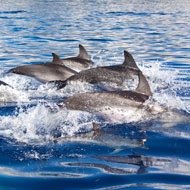First resident dolphins found in English waters

As dolphins are so wide-ranging, strong evidence is required to show that an area is important, before protection can be considered. (stock photo)
The first population of resident bottlenose dolphins has been discovered off the south west coast of England.
A distinct social group of 28 dolphins are present throughout the year in shallow coastal waters around the south west, according to lead researcher Rebecca Dudley, of the University of Plymouth.
She gathered data from a number of collaborators between 2007 and 2016. Using thousands of records, she identified 98 individuals, of which she was able to identify the pod of 28 resident dolphins. Individuals can be recognised by their dorsal fin, which has a distinctive shape and markings.
Cornwall Wildlife Trust, who also took part in the research, said the discovery could have significant implications for the conservation of the species, as there is currently no specific protection for the dolphins in their home range.
The species faces a number of threats in the south west, including pollution from plastics and chemicals, injury by fishing net and disturbances from recreational activities.
However, as dolphins are so wide-ranging, strong evidence is required to show that an area is important, before protection can be considered. Two other resident bottlenose dolphin pods, in Wales and Scotland, have already received protection.
“This research is proof that we have a resident population and is incredibly exciting,” said Ruth Williams, marine conservation manager at Cornwall Wildlife Trust.
She continued: “The future of these iconic animals is in our hands and we need to make sure the few we currently have in the south west are given the protection not just to survive, but to thrive.”
Highlighting the existence of a resident population is the first step in gaining protection for the species. Now, further evidence on their movements and behaviour is needed to strengthen the case.



 The Veterinary Medicines Directorate (VMD) is inviting applications from veterinary students to attend a one-week extramural studies (EMS) placement in July 2026.
The Veterinary Medicines Directorate (VMD) is inviting applications from veterinary students to attend a one-week extramural studies (EMS) placement in July 2026.